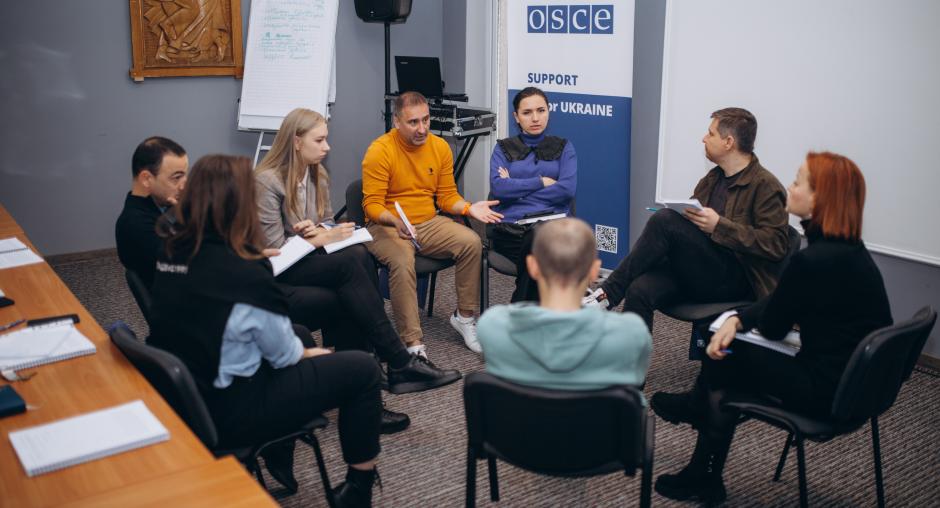OSCE-supported seminar provides Ukraine’s media community leaders a space for in-depth review of journalistic ethics and challenges to media freedom in times of war

Ukrainian journalists, editors, media managers, communication experts from governmental and public sectors spent four days in a Carpathian resort to withdraw from day-to-day work hassle and war-related trials in order to take a critical look at the state of affairs in country’s media sphere at a seminar organized by Aspen Institute Kyiv and the OSCE Secretariat Extra-Budgetary Support Programme for Ukraine (SPU). The event "Media and Reality: Dimensions of Responsibility," that took place in Polyana, Zakarpathia oblast on 29 November – 3 December 2023, involved 24 media community leaders selected through an open call for applications.
Aspen methodology organizes the process of dialogue around the reading of classical works in philosophy, political science and communications, thus enabling the participants to look at their professional life and problems through the lens of values and moral dilemmas raised by modern and past thinkers. So, the discussions about the notions of freedom and democracy were closely intertwined with participants’ sharing of own experiences and challenges, also related to the ongoing war.
“I recognise and salute the unwavering courage of Ukrainian journalists, media workers and all other media professionals. Their efforts to maintain a flow of journalistic information are the foundation upon which transparency and accountability are built, and which sustain the social fabric in times of adversity,” said Teresa Ribeiro, the OSCE Representative on Freedom of Media, at a pre-recorded video address to the participants of the seminar.
“You are all high-level professionals who have so much experience, it is not up to us to give you advice on how to do your job, but we are glad to have provided to you a space and time for reflection on what you do and how do it. It is important, because in times of war, more than ever, people need accurate and balanced reporting about what is happening,” - said Pierre Baussand, OSCE Secretariat Extra-Budgetary Support Programme Manager, at the event.
The seminar enabled participants to network and exchange ideas on media freedom, impact of war and propaganda on journalistic community, effects of media on sustaining international support for Ukraine, as well as media ethics and self-regulation tools.
“From the governmental perspective, in a democracy it is always better if journalists themselves set the plank of standards and keep it high, so that no other regulations are needed in the name of public interest. Such meetings as this are a good tool for media community to slow down, cast a critical look at yourself and your work, assess it through the prism of values of your profession, and in the end you have a chance to lead by your own example other members of journalists’ community to more ethical and quality reporting of current affairs,” said Taras Shevchenko, Deputy Minister of Culture and Information Policy of Ukraine, who joined the event’s discussions.
This effort is part of the project the SPU implements on request of Ukraine’s Ministry of Culture and Information Policy and non-governmental Commission on Journalistic Ethics to promote self-regulation among media and enhance media-literacy of the audience. This work is being done with contributions from OSCE participating States and partners, full list of which is available here.
